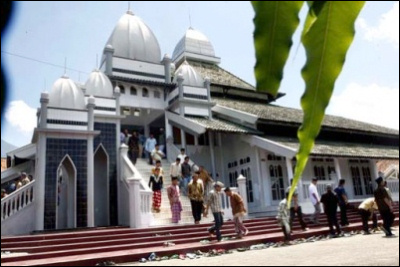NATIONALMon, 06/27/2011 5:19 PM
Prosecutor weak in Ahmadiyah trial: Elsam
The Jakarta Post
A team monitoring the trials of an attack against religious minority group Ahmadiyah said Monday the prosecutor performed below standard.
It said many witnesses’ statements were not well-explored during the trials.
Wahyu Wagiman, a team member from the Institute for Policy Research and Advocacy (Elsam), told reporters the prosecutor ignored statements from key witnesses such as Muh. Kamil Safei over the 13 trials.
“Kamil said in a trial that he received a text message from Ujang Muh. Arif, a case defendant, saying that Habib Rizieq, the Islamic Defenders Front [FPI] leader, would be held responsible for the riot,” Wahyu said.
The prosecutor did not question the content of the text message further, Wahyu added.
In February, about 1,500 people attacked Ahmadis in Cikeusik, Banten, killing three.
Eleven defendants are being jointly tried for an assault causing death, inciting violence, maltreating others, participating in assault and illegally possessing sharp weapons.
Prosecutors declined to charge anyone with the murder or manslaughter of the three Ahmadis.
The next trials will be held on June 30 and July 3 at Serang District Court. (rpt)
It said many witnesses’ statements were not well-explored during the trials.
Wahyu Wagiman, a team member from the Institute for Policy Research and Advocacy (Elsam), told reporters the prosecutor ignored statements from key witnesses such as Muh. Kamil Safei over the 13 trials.
“Kamil said in a trial that he received a text message from Ujang Muh. Arif, a case defendant, saying that Habib Rizieq, the Islamic Defenders Front [FPI] leader, would be held responsible for the riot,” Wahyu said.
The prosecutor did not question the content of the text message further, Wahyu added.
In February, about 1,500 people attacked Ahmadis in Cikeusik, Banten, killing three.
Eleven defendants are being jointly tried for an assault causing death, inciting violence, maltreating others, participating in assault and illegally possessing sharp weapons.
Prosecutors declined to charge anyone with the murder or manslaughter of the three Ahmadis.
The next trials will be held on June 30 and July 3 at Serang District Court. (rpt)
Copyright © 2008 The Jakarta Post - PT Bina Media Tenggara. All Rights Reserved
URL: www.thejakartapost.com/news/2011/06/27/prosecutor-weak...
URL: www.thejakartapost.com/news/2011/06/27/prosecutor-weak...












